
Ride on a dead horse
The previous posting concluded the chronological record of Billy
Hoad’s early working years with an account of his venture into a
business of his own in the early years of the new century. This
final entry of the site will go back some fifteen years earlier to
when he was juggling the demands of school and part-time
work.
Billy Hoad worked at many jobs before he commenced his
apprenticeship to the “three branch trade” with Sendall Brothers,
Horsham. One of these was relief postman to allow the regular
postmen to have their day off every second Sunday. This is an
account of one particular Sunday postal run that Billy wrote some
seventy years after the event. He was living in retirement in
Norwich at the time and he wrote the account as a letter to his
daughter Mary who had emigrated to New Zealand with her husband and
children in 1948.
18 June 1960
My dear Bup[1],
Last night was very hot; I did not sleep very well, woke up about 2
a.m. and began to ruminate, quite peaceably, I find I do this at
times, and without any conscious effort of mine, some incident or
adventure of my lurid past , that I may not have thought of for
years, looms up, as clear cut as if the affair only happened
yesterday. Memory plays queer tricks! I find I can read a book with
interest and forget it within a week; on the other hand some things
that may have happened years ago are remembered in detail quite
uncanny. I had such an experience last night, regaled our little Ma
with it over our early morning tea.
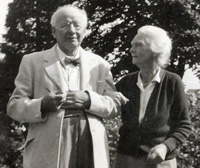 Kit and Billy Hoad, c.1958
Kit and Billy Hoad, c.1958
She responded with: “Now why don’t you write this and send it to
Bup, she would love it, so would the boys!” Well, there is no
accounting for taste; I’ll accept no blame. You don’t have to read
it or pass it on to the boys. I may have to be rather windy to make
things clear, but I won’t exaggerate. So here goes:
I think you may have heard that we as a family did lots of odds and
ends of service for the Post Office at Horsham, among them my
worthy Pa drove the mail on alternate Sundays to West Grinstead and
Champions Gate; later I did a similar trip to Cowfold and about two
miles beyond, also on alternate Sundays. It was considered
necessary to give the regular Postman – and his horse – one day’s
rest in 14.
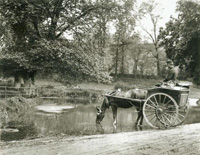 Postman with horse and cart, Sussex,
1902, courtesy of West Sussex Past Pictures;
Photo credit.
Postman with horse and cart, Sussex,
1902, courtesy of West Sussex Past Pictures;
Photo credit.
One Sunday during the winter of 1888/9, I being a man of some 15
years, Dad and I got up as usual on these mornings at about 5
o’clock, went to stable to feed our two steeds and found the roads
ice bound! Only one horse was “roughed”. i.e. special front nails
had been fitted to its shoes on the day before. The other was not
“roughed”. I did not fancy driving the 8 miles there and 8 miles
back with a horse slipping all over the place and possibly coming a
cropper, so it was decided that I would walk and Dad have the horse
that was “roughed” and safe on ice as the Champions Gate round was
usually heavier than Cowfold.
So, home to breakfast then to Post-office to sign in, sort mail and
out by 6 o/c.
Well, I got to my journey’s end without incident, walking on the
grass verge when I could to avoid slippery road. On the way back,
near Woldringfold (the home of Lady Archer).
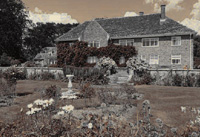 Woldringfold, Photo credit.
Woldringfold, Photo credit.
I was hailed with “Hullo young Hoady, what yer doin’ out here?”
There was old Jim Langley with a knacker man’s float or cart and a
dead horse on it. I explained I was doing George Wooster’s post
round. Sez he “Want a lift? Jump up behind. Hang yer bags on
sideboard and mind yer don’t slide off!” I explained I had to stop
at sundry places to clear boxes, pick up private bags etc.
“Or’right, I kin stop too, it’ll give the old nag a blow, it’s bad
goin’, he could do with a blow. I had to knock up Jim Sharp goin’
down to get him roughed. Bimey, he sez, what the hell do you think
I’m a goin’ to git up Sunday to git you roughed? Yes I do, I sez,
so he sez, I’ll see you damned first! Or’right, I sez, you git on
with yer damning, I kin wait , when yer done you’ll rough my ’oss
and I’m stopping here till yer do. Bi’m’by he gits up, gives me a
glass of home brewed, roughs the old ’oss and off we goes.”
Later he remarks, “How come you a walking, yer old Dad got two
’osses ain’t he?” I explained one horse only was roughed , Dad had
gone to West Grinstead with it. I said I would walk rather than
travel with a horse with smooth shoes on roads like this. “Yes,
you’re a wise kid, yer might ’ave broke yer bloody neck goin’ down
Birchin Bridge hill. I slided all over the shop, nag went down on
his arse once, had sense enuf to git up. But why didn’t yer knock
up old Frank Parkhurst (a farrier in Denne Rd.) an get ’im ter
rough yer?” I explained I thought Mr Parkhurst would not want to be
knocked up on Sunday morning etc. “You bet yer boots he wouldn’t,”
said Jim Langley. “I’d like to bin there, you thro’in’ stones up at
his window, he pokin’ his ’ed out, and when he sees yer, blimey,
wouldn’t he create!”
I should explain, Mr Langley is a big burly lump of good humour,
6’2” long, proportionately thick, rather beyond upright, a well
cultivated taste for beer, a Bardolphian countenance like a
November sunset, dressed in a very old coat with shoulder capes
like old coachmen used, two waistcoats, both unbuttoned, a pair of
riding breaches too small to encompass his middle, finishing just
below the knee, then a patch of hairy leg and finally boots.
Well, we rode along talking of horses alive or dead. I enquired as
to the history of the horse I was sitting on. Mr Langley explained
it was from George Isted’s place. Mr Isted was a baker some mile or
so beyond Cowfold. I asked Mr Langley had he slaughtered the horse?
“No,” said he, “I got there just too late to save his life, as yer
might say, with my pole axe, the poor critter.” I asked Jim Langley
what he thought was the cause of the horse’s untimely end, it
appeared to be the corpse of a not very old, healthy animal. What
caused it? “Why, heart disease caused it,” said J.L. with
confidence, “These bloody bakers kills all their ’osses sooner or
later. I’d’s sooner trust a tailor with a ’oss than a baker. They
loads up the cart widout any notion of balance, they gerally ’as a
’oss too big or a cart too small consekently the belly band is too
tight under his guts and the critter can’t breathe and his heart
conks out, or the load rides on the pad all the time and that’s
like enough to break his back and his heart too.” Then quite
suddenly JL stopped and said, “Yer old Daddy had one of George
Isted’s ’osses a time back, then after a week or two I see he was
back in Isted’s cart again. Did the old man forget to pay for it?”
“No, Mr Langley,” I replied with some warmth, “My Dad paid Mr Isted
£5 for Jack and reckoned it was one of the wisest and best horses
he ever had, then one day Mr Isted called and offered Dad £6 for
him. He said he had a new man with a new horse and neither knew the
round. Jack did, so my Dad let him have Jack back again for £6 and
when the new man knows the round we are going to have him again!”
Mr Langley seemed to accept this, remarking “I reckun old Isted
never know’d the round ’isself. The man who used to drive old Jack
got sick and died, so he gits another man and a new ’oss and I
reckun he was in a proper fix.”
Well, we drove along up Crabtree Hill to Lower Beeding Post Office,
collected the bag, calling at South Lodge, and on to the lower
entrance gate to Leonardslea.
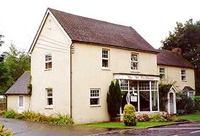 Lower Beeding Post Office, Photo credit.
Lower Beeding Post Office, Photo credit.
I explained I had to go in here and out at upper gate. This meant
passing front entrance of mansion. Mr. Langley was rather dubious
about this. “If,” said he, “old Lordy Loder catches sight on us,
he’ll send for the copper, or get his gun and shoot the lot on us.
Look ee boy, you walk on, leave your mail bag here, I’ll wait for
you at the gate.” (Lordy Loder was Sir Edmond Loder, BT., a mean
and selfish aristocrat, in due course he was gathered to his
fathers, Lady Loder produced a posthumous son a few weeks later,
but the title would have become extinct but for the grace of the
most gracious Queen Victoria. So this son succeeded to the title.
He was killed at the Battle of Gaza while leading the 7th Sussex
which included our two boys Geo. Winder and Fred Cook.[2] His wife also produced a posthumous son,
Sir Giles Loder of that ilk. He, Sir Giles, succeeded me as
Chairman of Kenneth’s boy’s club[3],
it had by then become fashionable. Roy thought he made a good
chairman at A. Gill but was of no further use so he had been
tactfully got shut of. The Loder family concern is the old
established firm of Russia merchants. Giles Loder Ltd., importers
of Russian tallow etc.)
On coming out of Leonardslea top gate there was Jim Langley with
the dead horse and a lady on the float.
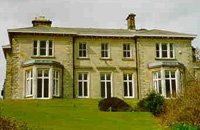 Leonardslee, by Mlednor, Photo
credit.
Leonardslee, by Mlednor, Photo
credit.
A mature and weather-beaten personage of what was used to be called
the nailed and pelted variety who tramped from place to place doing
all sorts of work on farms when there was a seasonal demand. She
and J.L. were evidently talking about my mail bags and didn’t see
me for a minute or so. “Got a new passenger, Mr. Langley? Hand my
bags down and I can walk the rest.” To this J.L. replied, “Walk be
damned, this is an old sweetheart of mine, there’s plenty of room
on the poor beast for the two of yer. Git yer legs tucked in over
his shoulder, yer won’t slide off then. Pull those rugs off, boy.
Make her tuck her legs in same as I sez, the old ’oss ain’t cold
yet, he’ll keep yer both warm, that’s right, now pull the rug over
yer, they stinks a bit maybe but nothin’ to hurt yer!” J.L. is
directing operations from his high seat in front of the float and
having a rather disjointed conversation with the lady as to the
ownership of something she is inclined to think Mr Langley has
stolen. Well, off we go. The lady is still unhappy about something,
turns on me rather sharply with “Now look here, you tell me
straight where you got this stuff (my bags). He sez they’re yours.
They look like Post Office kit.” I explain they are Post Office
kit, that I’m a Postman. “You a Postman! Where’s yer Postman’s
hat?” I explain I am a Sunday substitute etc. “Now look here young
un, I don’t want ter get mixed up in anything. If yer don’t tell me
what’s in them bags and where you come by ’em I’ll give yer a wipe
across the kisser. A pretty sort of fool I’d look, and old Jim, if
a copper come along and got a bit nosey!” At this Mr. Langley
losing patience remarks, “Oh for Christ’s sake leave the kid alone
Nell. I tell yer he’s alright. I know him and his Daddy, known him
fer years. Look here, are yer cold, or are yer hungry, or what?” “I
be both, Jim,” said the lady. “Or’right,” says Jim, “Wait till we
gets to Felix Thorn’s place and we’ll see what he got to eat.”
(Felix Thorn kept a little pub at Mannings Heath).
When we got to the road leading to Mannings Heath, old Jim said,
“Well, yer better slide off now, young Hoady. You can tell yer Mum
you been for a ride with a lady on a dead ’oss.” I thanked him. He
replied, “That’s alright, cocky. Mind yer don’t slip up on yer
arse, roads wuss’n ever. Giv’m goo’bye, Nell,” and Nell did.
P.S. I should explain Mr. Langley was just such a chap as John’s
friend Tom Lambert but a size or two longer. He was employed by Jim
Tidy whom you may have known. His duty on that Sunday afternoon
would be to take the ‘jacket’ of the dead horse before it was cold,
prepare it for tan yard, then next day boil the flesh for dogs
meat, the innards thrown on a heap after treatment with lime to
keep rats and foxes off. This in a yard in Pondtail Lane close to
the railway. You may have seen the shacks from the train, and
sensed the aroma!
This concludes the diaries and reflections of Billy Hoad.
- [1] Billy and Kit’s pet
name for their daughter Mary.
- [2] Billy is referring
to a couple of employees of Hoad and Taylor, the building firm
whose early years is described in the previous posting: ‘Starting a
business on our own’.
- [3] Billy’s son-in-law,
Rev. Kenneth Prebble, was a curate in Horsham at the beginning of
WW2. One of his duties was to get a boys club started.
Share this
page (third party services may set cookies)